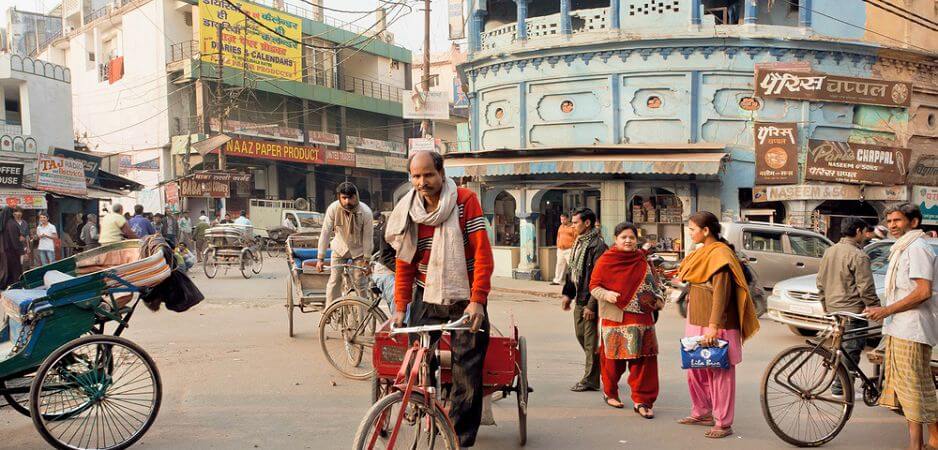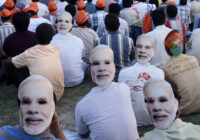It appears the BJP government in India has taken a decision to crush all opponents.
In India, the Bharatiya Janata Party (BJP) and its ideological parent, Rashtriya Swayamsevak Sangh, do not have much faith in democracy. For this reason, they try to suppress every voice against them. Dialogue with the opposition, which is a common way of resolving disputes, is not something they usually resort to. They believe neither in freedom of expression nor in the right to dissent. They adopt repressive measures when someone else uses violence and ignore the violence of their own people.
In 2016, at least 100 people were blinded in Kashmir due to the use of pellet guns and hundreds more experienced damage to their eyes. The BJP government does not appear to consider Kashmiri people as its own. The government has treated them more like enemies and still believes it can subdue them by force. The home minister talks of bringing normalcy to Kashmir. This probably implies more force will be used. The idea that people should be engaged in dialogue is outside the realm of possibility for BJP leaders, because they have presupposed that everyone using violence against the state is anti-national. For them, it is scandalous to talk to anti-nationals.
On April 21, 2017, Raghav Lakhanpal Sharma, a BJP member of parliament, tried to hold an Ambedkar Jayanti march through a Muslim locality without the permission of the administration in Saharanpur, Uttar Pradesh. When the police tried to stop the procession, the ensuing mob, which included two members of the legislative assembly, attacked the residence of the senior superintendent of police. No action was taken against Sharma, but the superintendent was transferred. How is the action of Sharma different from a Kashmiri throwing stones at the Indian army?
On May 5 in the Shabbirpur village of Saharanpur district, Dalits objected to loud music being played along with a procession held by the Thakur community to mark the birth of Maharana Pratap, a 16th-century king. In the ensuing scuffle, a Thakur died of suffocation. In response, Thakurs burned up to 60 houses of Dalits. An organization of Dalits, the Bhim Army, registered protest and burned some government vehicles in the process. The leader of Bhim Army, Chandrashekhar, was arrested after a few days.
Now, the administration is trying to find fault with people on both sides in both cases. Muslims and Dalits are also being accused, despite it being crystal clear as to who was responsible for the provocation. How one-sided the violence was can be gauged from the fact that Thakurs can burn the houses of Dalits but not the other way round. Small errors of Muslims and Dalits are being exaggerated, whereas monumental mistakes of the upper caste are being underplayed. Sharma has been let off as if nothing happened.
Questions arise as to why no strict action was taken against the MP that could have prevented subsequent incidents, as it would have sent a clear message that anyone who tries to disturb law and order will be dealt with in a stringent manner. It is being repeatedly seen that any violence of cow vigilante groups against a suspect is simply ignored by police — as with Pehlu Khan in Alwar, Rajasthan on April 1 — but if anyone questions the actions of the government, then it results in a repressive backlash.
 On June 6, police in Madhya Pradesh opened fire on protesting farmers in which five people lost their lives while another died later. Ram Manohar Lohia, an activist for Indian independence, used to say that in a democracy a government that opens fire on its people has no right to continue.
On June 6, police in Madhya Pradesh opened fire on protesting farmers in which five people lost their lives while another died later. Ram Manohar Lohia, an activist for Indian independence, used to say that in a democracy a government that opens fire on its people has no right to continue.
In Uttar Pradesh, 11 students of Lucknow University were sent to jail for trying to stop the cavalcade of Chief Minister Yogi Adityanath and showing him black flags. Is there no space for dissent in democracy? As the minister was going to attend a program in university, could he not have invited the students for dialogue? Beacon cars are now prohibited in the state in an attempt to end the VIP culture. However, whether the beacon is there or not, if punishment for stopping a minister’s car is jail then the car still continues to be terror for people.
On June 9, vendors who set up carts outside Banaras Hindu University (BHU) hospital in Varanasi and used to cater to patients and their relatives were forcibly removed by the police. When they protested they were arrested. When BHU students protested against the arrest of vendors, they too were arrested. In all, 26 vendors and students went to jail and had their bail set at Rs5 lakhs ($7,750) each.
CRUSHING OTHER TEA SELLERS
Is it such a big crime to defend one’s right to livelihood? In the violence that police perpetrated on vendors, each of them suffered a material loss of about Rs20,000 ($310). The biggest worry for vendors is when they are out on bail, how will they earn a living? A person who claims to have been a tea seller once upon a time has snatched the livelihood of a number of tea sellers from his parliamentary constituency in a very cruel manner.
It appears the BJP government has taken a decision to crush all opponents with an iron hand. It does not even make an attempt to understand the other point of view. The party has this arrogant outlook that anyone opposing it is anti-national. From the BJP’s narrow point of view, a large number of people in India will fall outside its domain of nationalism.
When you don’t accept any other point of view, then it is an indication of fascism. Violence is a necessary part of fascism because if it’s impossible to convince the opposition, then that opposition is to be eliminated.
The views expressed in this article are the author’s own and do not necessarily reflect Fair Observer’s editorial policy.
Photo Credit: Radiokafka / Shutterstock.com
Support Fair Observer
We rely on your support for our independence, diversity and quality.
For more than 10 years, Fair Observer has been free, fair and independent. No billionaire owns us, no advertisers control us. We are a reader-supported nonprofit. Unlike many other publications, we keep our content free for readers regardless of where they live or whether they can afford to pay. We have no paywalls and no ads.
In the post-truth era of fake news, echo chambers and filter bubbles, we publish a plurality of perspectives from around the world. Anyone can publish with us, but everyone goes through a rigorous editorial process. So, you get fact-checked, well-reasoned content instead of noise.
We publish 2,500+ voices from 90+ countries. We also conduct education and training programs
on subjects ranging from digital media and journalism to writing and critical thinking. This
doesn’t come cheap. Servers, editors, trainers and web developers cost
money.
Please consider supporting us on a regular basis as a recurring donor or a
sustaining member.
Will you support FO’s journalism?
We rely on your support for our independence, diversity and quality.






